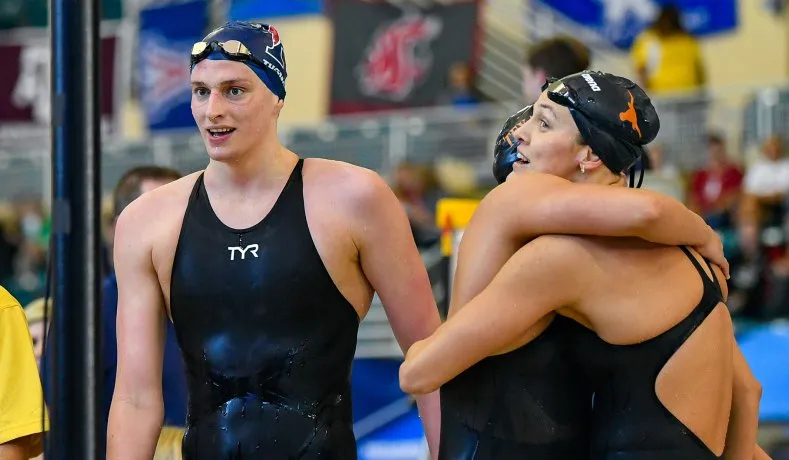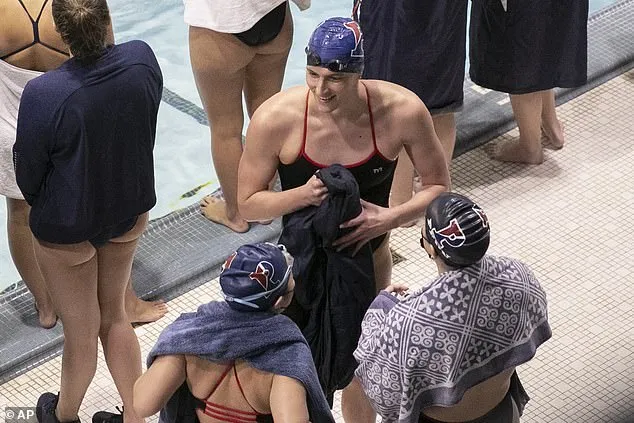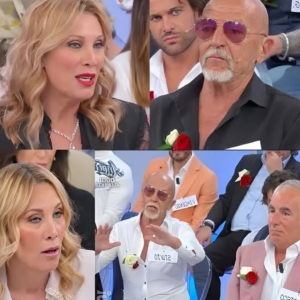In a decision that has reignited the heated debate over gender and fairness in sports
a high school girls’ swimming team made headlines by refusing to compete against a biological male swimmer.
Their reasoning was simple: “It’s not fair.” This bold stance has sparked widespread discussions about inclusivity, fairness, and the future of competitive sports.

The controversy over transgender athletes participating in sports is not new. Advocates for transgender inclusion argue that athletes should be able to compete in categories that align with their gender identity. On the other hand, critics raise concerns about fairness, particularly in women’s sports, where biological differences between males and females—such as muscle mass, bone density, and testosterone levels—can significantly affect performance.
For many, the question is whether allowing athletes who have undergone male puberty to compete against female athletes is fair, given potential physical advantages. The girls’ swimming team’s decision to withdraw reflects their belief that such competitions place them at a disadvantage, questioning the fairness of forcing young women to compete under these conditions.
The actions of the high school team highlight the complex challenges that arise when fair competition and inclusivity collide, particularly in youth sports. For student-athletes, sports are not just about competition—they foster teamwork, discipline, and self-esteem. When these values clash with issues surrounding gender identity, it places young athletes in the middle of an ongoing societal debate.

The situation also underscores the difficulties sports organizations face in balancing rights without excluding or disadvantaging certain groups. How can we create an environment where every athlete feels included while ensuring fair play for all competitors?
Sports governing bodies, including the International Olympic Committee (IOC), have attempted to address the issue by implementing hormone therapy requirements for transgender athletes. However, these guidelines have been met with criticism from both sides. Some argue that hormone levels alone may not eliminate competitive advantages, while others view such policies as discriminatory toward transgender athletes.
The legal and ethical dimensions of the issue are also evolving. Title IX, a U.S. federal law prohibiting sex-based discrimination in education, plays a pivotal role in this debate. The interpretation of Title IX in the context of transgender participation in sports is still contested, with ongoing discussions about how to protect the rights of all athletes.
The debate around Lia Thomas, a transgender swimmer from the University of Pennsylvania, exemplifies the complexities involved. Thomas, who transitioned during college, sparked intense discussions when she began competing in women’s collegiate swimming.
While many saw her as a symbol of progress for transgender athletes, others criticized the fairness of her participation, arguing that her background provided her with unfair advantages over cisgender female swimmers. Thomas’ journey has become a focal point in the larger conversation about how society balances transgender inclusion and athletic fairness.
The high school team’s refusal to compete is part of a broader, evolving dialogue about fairness and inclusion in sports. At its core, the debate challenges us to rethink long-held beliefs about gender and athletic competition.
Achieving a fair and inclusive environment will require ongoing conversations, honest reflection, and a willingness to adapt. These discussions may be difficult, but they are necessary to shape the future of sports in a way that respects the identities and abilities of all athletes.

The high school swimming team’s decision is more than just a protest—it’s a statement that touches on the heart of one of today’s most contentious issues. As society continues to grapple with the intersection of gender, fairness, and inclusivity, the way these debates unfold will have profound implications for the future of competitive sports.
Ultimately, the goal should be to create a sporting environment that is both inclusive and fair, where athletes of all backgrounds can thrive without compromising the integrity of competition. Listening to the athletes most affected by these decisions will be essential in navigating these challenges and building a sports culture that reflects the values of respect, fairness, and inclusion.
As the debate continues, thoughtful solutions will be necessary to ensure that every athlete can participate and compete on a level playing field—one that upholds both individual rights and the principles of fair competition.





